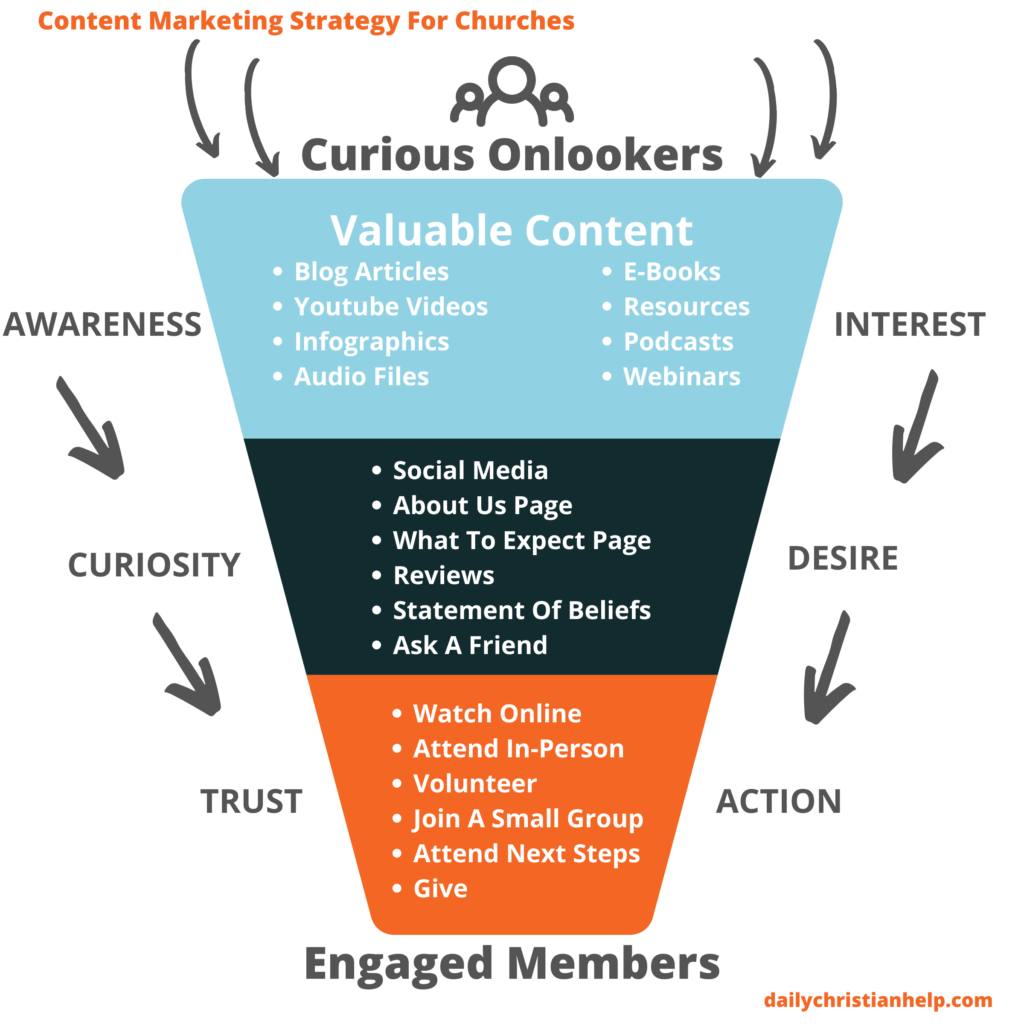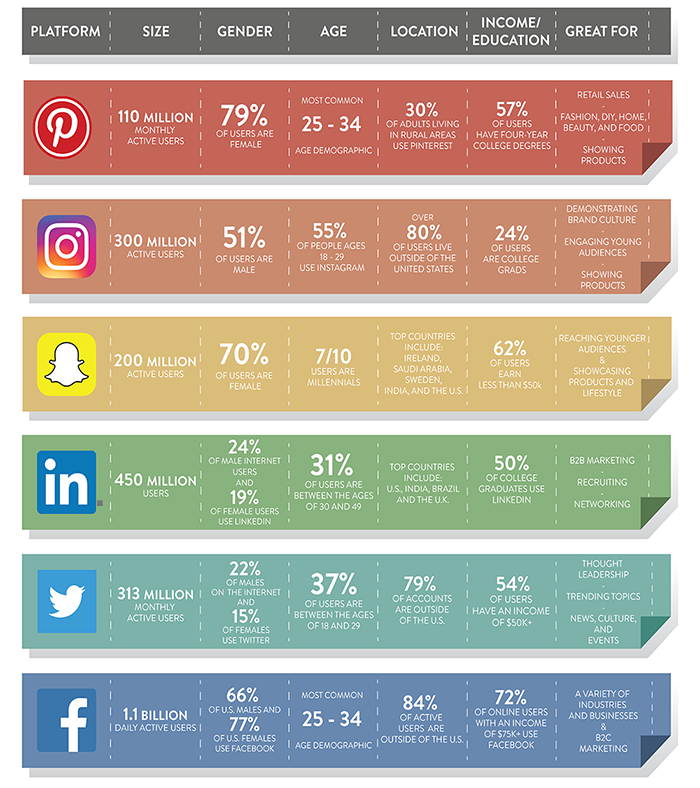Content marketing for churches is nothing new; however, how the strategies are different today than it was a few short years ago. Churches are continuously creating content, at least once a week, for sure in the form of a sermon.
Even if the content your church is creating is the weekly sermon, that’s still fifty-two pieces in a year. Content marketing for churches can be much more robust, and there are incredible ways to connect with your church members and those you’d like to invite throughout the week.
Implementing a content marketing strategy is a powerful way to provide your church with helpful resources, stay relevant online, and reach new people.
So as a church, how can you create a content marketing plan? Keep reading to learn why content marketing can benefit the church and the different types you can use to serve your audience.

What Is Content Marketing For Churches?
Content marketing for churches is a strategic plan to serve, help, and provide value to your audience using various forms of content.
Content marketing is a long-term strategy that focuses on building a solid relationship with your target audience by consistently giving them high-quality content relevant to them. – neilpatel.com
Sometimes, pastors or church leaders confuse marketing with being “worldly” or manipulative. While some tactics are; tried and true marketing strategies that stand the test of time, build trust, and pique interest are valuable strategies the church can use to serve people.
If you utilize content marketing but need more digital marketing strategies and ideas for churches, visit the post: Digital Marketing For Churches Made Easy In 5 Simple Steps.

Why Content Marketing For Churches Is Important
Content marketing is a way for churches to effectively engage in digital ministry to build trust with a specific audience.
Content marketing can help churches convey to those they want to reach that they care about their needs and are committed to providing helpful resources for them.
7 Things That Content Marketing For Churches Is:
- Genuine Ministry
- Helpful To Its Audience
- Servant-Hearted
- Evergreen
- Relevant To Outsiders
- Strategic & Thoughtful
- Relational
7 Things That Will Ruin Content Marketing For Churches:
- Promoting Your Church Like A Product
- Bait And Switch Tactics
- Using Gimmicks
- Trend-Hopping
- Impersonal
- Focusing More On The Church Than The Needs Of People
- Ignorable Ideas
Content marketing for churches can open up new ministry opportunities with the right heart and approach. When done wrong, it’s obvious, cringy, and dismissed but not forgotten.
You’ll likely always have an audience if you produce content that genuinely helps your audience. People are drawn to things that support them, improve their lives, or give them greater meaning. – careynieuwhof.com
Today, there is more clutter, information, and noise vying for people’s attention. Your audience longs for voices that help make sense of this world and add value to their lives. Your church can be one of those voices.

Consistent, high-quality, and engaging content impacts audience decision-making more than any other technique. – hubspot.com
5 Desirable Benefits When Churches Use Content Marketing Strategies
1. Content Marketing Can Raise Awareness
Depending on who you want to reach, you can use content marketing to generate awareness of your church, its mission, the Gospel, an upcoming sermon series or event, a specific ministry, or valuable help for people’s problems.
2. Quality Content That Others Find Helpful Builds Trust
People have and will always have doubts, questions, and hesitancy about connecting with a local church. Providing valuable content that addresses and helps resolve problems people are facing can demonstrate your church serves and cares about the needs of your community.
3. Church Members Will Share Content They Believe In With Conviction
Content marketing is a great way to equip your church members with resources to share with their friends, family, and followers. People are willing to support ideas, principles, and values that align with their beliefs.
4. Content Marketing Can Give Your Audience An Idea Of What Your Church Is Like
People don’t live in your church building. They live in the community, where they interact with non-Christians all day long, every day. Churches that equip people where they live and work will start to grow. – careynieuwhof.com
Giving people a glimpse of your church by engaging online is an effective way to keep new visitors coming.
5. Content Can Clarify How To Take Next Steps With Your Church
A vital aspect of content marketing for churches is to provide a clear call to action. If someone engages with your content, what is the next step you want them to take? Do you want them to:
- Visit A Contact Us Page?
- Provide Their Email?
- Watch A Video?
- Add A Comment?
- Ask A Question?
- Share With Their Friends?
- Attend A Service?
- Sign Up To Volunteer?
Thoughtful content that serves your audience can elicit a desire to take action; churches that provide value and clear next steps will create more opportunities to engage with people.

The Church Engagement Journey
Everyone who engages with a church is on a journey of three sequential steps. The three steps are awareness, curiosity, and trust. Each aspect of this journey is a progressive step that individuals take toward deeper engagement.
The rate at which people progress through these steps will vary and obviously is influenced by the Holy Spirit, personal relationships, and beliefs.
The three stages also apply to how individuals interact with content marketing from your church.

The Awareness Stage Of Content Marketing For Churches
Individuals at this stage become aware of your church, they don’t attend, and you don’t have any contact information. Their willingness to take a step purely hinges on their interest in the content you’re sharing. Therefore, it’s crucial to craft meaningful and helpful content for a specific audience.
The Curiosity Stage Of Content Marketing For Churches
If people find your content helpful in the awareness stage, they will be interested in learning more about your church. When a person becomes curious about your church, they will take the next step to learn more about things like, what you believe, service times, or if they know anyone who attends.
As you can see, having a thoughtful plan for how newcomers engage with your content is essential. Ensuring that you have the right content with the proper call-to-actions can naturally guide individuals curious about your church.
The Trust Stage Of Content Marketing For Churches
The content you use can build trust with those who interact with it. Creating content that resolves a specific problem or pain and sharing it with the right audience is an excellent way to serve your audience.
Creating quality content means more than simply writing good copy. It’s also about considering the informational needs of your audience as you are planning your content initiatives. Ensure that each content piece answers the right questions, creates a good user experience, and provides actionable value. – contentmarketinginstitute.com
Content that adds is relevant, adds value, and helps solve a problem for your audience can help assure that your church is a good fit for them. When a person trusts your church, their level of engagement naturally increases.

6 Effective Types Of Content Marketing For Churches
A Quality Website
A website is the central hub of critical information about your church. When people want to find a church to attend or visit, they do not drive around town; they use Google.
- 46% of all searches on Google seek local information
- 86% of people look up the location of a business on Google Maps
- 76% of people who search on their smartphone for something nearby visit within a day
Simply stated, if you want your church to be discovered by an individual in your local area, more often than not, that discovery process is going to take place online. – nucleus.church
Creating a quality, user-focused website is easier today than ever before. You can work with a team of professionals or build one yourself.
The days of knowing code and developer language are long gone. To create your own website, check out the post: 3 Best Church Website Builders Software Platforms Specifically For Churches.
A Church Blog
Blog articles are a powerful way to provide helpful information and generate new traffic to your church website. For example, I know of one church that gets thousands of visitors a month to its blog.
By addressing relevant topics and writing about issues that people search for, the church can create awareness that eventually leads to engagement.
Do you want to start a blog for your church that can do the same? Visit the post, 10 Christian Blogging Strategies That Improve Content & Gow Traffic.
Videos
Churches can use video to share testimonials, short snippets from recent messages, or address a common problem that people experience. Videos can be highly effective at connecting with an audience if they are relatable.
Video marketing is more effective than other mediums because it helps engage viewers audibly and visually immediately. Video can capture people’s attention faster because it can appeal emotionally and intellectually with powerful visuals and stories. – ironhousestudios.com
Using videos can help make your church more approachable by sharing story-driven content.
Podcasts
Creating a podcast for your church to share sermons, host conversations, or share ideas is a smart way to provide valuable content to your audience. One recent study found that 49% of 12-34 years old listened to a podcast within the last month. And, 56% of podcast listeners average three or more podcasts in the last week.
Podcasting is a convenient way for listeners to interact with content: they are personal, on-demand, and time-efficient.
InfoGraphics
Infographics are a fun, appealing, and informative way to share helpful information in an easy-to-understand format. Think about sharing ideas from a sermon, bible verses, outreach statistics, or other relevant content that users will find beneficial with visually appealing graphics.
Downloadable Guides
Think of the endless ways you can offer free information to help people address a problem they’re facing. There are lots of topics that your church could create a PDF that people can easily access and download.
Below are several examples of the type of guides you could create to serve different groups of people your church can minister to:
- 4 Tips For Resolving Conflict & Increasing Communication In Your Marriage
- 3 Effective Ways To Have Conversations With Your Kids Without Boring Them
- 5 Scary Questions People Are Asking Before They Decide To Attend A Church
- 9 Ideas For Making Decisions In Your 20’s That You Don’t Regret In Your 30’s
There are so many content options that you can use to build trust with different people groups within or outside of your church.
Imagine sharing these resources and inviting others to download them from a page on your church website or to exchange their email on a simple landing page so that you can send it to them automatically using simple church email marketing strategies.

7 Parts Of An Effective Content Marketing Plan For Churches
1. Define The Content Marketing Goals For Your Church
The first step to putting a content plan together is clarifying what you want to accomplish. For example:
- Do you want to reach people that have never heard of your church?
- Double the amount of people who attend your next steps or Growth Track class?
- Invite people to an upcoming marriage conference? Raise awareness in your community of your church’s youth group?
The goals you establish will be unique to the vision of your church. For more help in defining your goals, refer to the 5 Necessary Steps For Churches To Start Successfully Using Digital Marketing.
2. Determine The Type Of Content You Want Share
There are several types of content that you can create, but which ones can you or your team begin to create with the most excellence and expertise? You can always add more mediums as you develop a strong content team. To help decide what content you should start with, first evaluate the following considerations:
- What is your budget?
- What expertise is immediately available?
- Which types of content fit the resources you already use (sermons, studies, devotionals, etc.)?
3. Make Content That Is Relevant, Helpful, & Specific
For the content marketing efforts of your church to be effective, you must create resources that serve and help people. There are a few questions to ask to help decide what the goals should be:
- Why do you want to create content?
- Who is the content for?
- What problem do you want to help solve?
- What next steps do you want to encourage?
4. Decide Where To Share Your Content
Even though there are many platforms to share content, that does not mean you have to nor should use them all. Finding out the social channels the people you want to reach use is important. Take time to evaluate which platforms will be best.

source: socialfactor.com
5. Create A Content Schedule
Using a content schedule will help ensure that you publish on time. It will also be a useful communication tool among your team to keep everyone on the same page. A content schedule can be pretty simple; it needs to answer three basic questions:
- Who is creating which pieces of content?
- Where is the content going to be published?
- When is the content going live?
6. Test Different Types Of Content
Don’t be afraid to try out different types to see what is the most engaging with your audience. As long as you are still answering the questions in steps 1-3, it’s okay to mix it up—test variations, colors, messaging, and call-to-actions. Doing so will help you create better, more compelling content.
7. Analyze And Measure Results
Measuring the results of your content is not as complicated as it may sound. If you define the goals in step one and assess the outcomes relevant to the timelines of your goals, you can better understand if your content plan needs adjustment.
Following a content marketing plan for churches can help clarify the purpose of doing so and guide the creative process. Working together as a team with a clear vision, a heart for people, and valuable content can provide tremendous value to those you want to reach.
5 Helpful Tips For Getting Started
- Know Your Audience For Each Piece Of Content You Share
- Repurpose Content You Believe Is Helpful
- Build A Team
- Focus On A Couple Platforms First
- Publish Content Consistently
Content Marketing For Churches Summary
Content marketing for churches is an incredible way to serve your community. It can open so many doors for sharing the Gospel, introducing people to your church, and providing value to pain points individuals are experiencing.
Churches are often experts at producing content; with a bit of planning, the resources you provide can be repurposed or used for inspiration to create entirely new content that connects with people in a new way.
Your church can engage in digital ministry effectively by employing some content marketing strategies. Use the tips outlined above to get started or guide your process.




